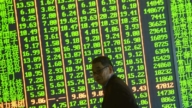【新唐人2012年7月17日訊】14號下午,中共總理溫家寶在成都主持召開河南、湖南、廣西、四川、陝西五省區負責人經濟形勢座談會。在會上,溫家寶這個月第二次對中國經濟下行發出警告。
溫家寶表示,當前經濟還沒有形成穩定回升態勢,經濟困難可能還會持續一段時間。
北京師範大學MBA導師段紹譯分析,中國未來幾年的經濟發展受到四個方面制約,可能很難趕上過去十年。
北京師範大學MBA導師段紹譯:「第一方面,就是中國的房地產泡沫現在非常的嚴重;第二點,就是國進民退,國有企業現在越來越強勢,這個民營企業越來越難做;第三方面,就是美國的次貸危機,加上歐洲的經濟不景氣,都影響到中國的出口;還有第四點,就是中國的金融業不發達,大量的民營企業根本就借不到銀行的錢。」
國家統計局上星期五(7月13號)公布的數據顯示,中國第二季度經濟增速降到7.6%,創下三年多來的新低。另外中國海關的統計數字顯示,今年6月中國的進出口與上個月相比分別都有所減少,特別是進口方面減少了8.9%,顯示中國國內對海外石油等燃料和原材料的需求進一步減少。
儘管如此,溫家寶表示,目前,經濟增速仍在年初確定的預期目標區間內,穩增長政策措施正在見到成效。
對此,政治經濟評論家草庵指出,由於中共建政以來一直只講好不講壞,隱瞞真正的事實,所以很多西方學者已經把溫家寶最近兩次講的「經濟大體穩定,有下行壓力」,看做自1978年鄧小平講「中國走向經濟崩潰的邊緣」以來,中共就經濟狀況第二次嚴重的講話。
草庵:「中國經濟狀況遠比中共對外公開的更加嚴重。而且整個經濟惡化的程度也是要嚴重的多。其實這反映一個問題是,溫家寶的講話,實際上是在從側面用婉轉隱晦的方式,表明中國經濟已經出現了一個不可逆轉的一個下行的一個趨勢。」
海外媒體評論,現在這個經濟放緩的時間點對於中共特別尷尬,因為在十八大權力交接之前,中共正在激烈的內鬥中試圖保持穩定,而中國的失業侵蝕了經濟增長,削弱了共產黨權力合法性,更多的失業將點燃民眾對利益階層的仇富情緒,增加政治變革的壓力。
草庵:「最近幾十年來中共就講一個道理,就是說,我們執政沒有經過選舉好像是不合法,但是我們在執政過程當中一直是經濟得到了發展,經濟發展就成為中共執政的一個依據。如果經濟上出現了問題的話,這個中共執政的合法性就受到了更大的質疑。」
英國《金融時報》中文網專欄作家徐瑾撰文表示,今年初中共政府的過度樂觀,導致了經濟政策繼續從緊,沒能及時掉頭,隨後形勢急轉直下,又導致貨幣政策急促應對。當下的數據顯示出,政策應當做出調整,而不完全是經濟全面企穩的信號。
徐瑾認為,中國經濟著陸已經沒有懸念,只是在著陸方式和重啓模式上存在爭議。她指出,中國企業實際上也和美國企業一樣,具有自我修復能力,但恰恰是因為政府之手「過分好動」,才造成了中國企業自我修復能力變弱,經濟依賴於政府啓動投資。
採訪/常春 編輯/尚燕 後製/柏妮
China Premier Wen Jiabo’s Economic Warning
On July 14, the Premier Wen Jiabao chaired an economic
meeting in Chengdu, attended by leaders from Henan, Hunan,
Guangxi, Sichuan and Shaanxi provinces.
During the meeting, Wen issued this month’s 2nd warning
about China’s economic drop.
Wen said that China’s economic rebound was not yet stable
and economic hardship could continue for a period of time.
Duan Shaoyi, Beijing Normal University lecturer, analyzed
that China’s economic development in the next few years
would be limited by four aspects and that it would be hard
to beat the last decade’s development.
[Duan Shaoyi, Beijing Normal University lecturer]:
“Firstly, China’s property bubble is now very serious.
Secondly, state-owned enterprises are increasingly stronger
and have developed well, but not private businesses,
which are becoming more difficult to develop.
Thirdly, the US sub-prime mortgage crisis and European
economic recession has affected China’s exportation.
Forthly, China’s financial sector is underdeveloped,
so private enterprises cannot get their funding from banks.”
July 13—the National Statistic Bureau released data showing
that China’s second-quarter economic growth had fallen to a 3-year low of 7.6%.
In addition, China’s Customs Statistics shows that import and
export figures had both decreased compared to June, with the import rate falling by 8.9%.
The fall in figures indicate a drop in China’s domestic demand
for the import for oil, energy and raw materials.
However, Wen Jiabao claims that, currently, the economic
growth rate is still within the target range set early this year and stabilization policies were taking effect.
Regarding Wen’s remark, Cao An, political and economic
commentator, tells a different story.
Cao An says that the Chinese Communist Party (CCP) has
always publicized the positive aspects of China’s economy
but has never mentioned the negative aspects, and that
the CCP have covered up the truth.
Many western scholars consider Wen’s remarks that the
“economy remains stable yet faces huge downward pressure”
as the most serious statement since Deng Xiaoping’s remarks
in 1978 that “China walks to the edge of economic collapse”.
[Cao An]: “The economic reality is much worse than
is publicized and the entire situation is more serious.
Actually, Wen’s remarks indirectly reflect that China’s
economic trend is taking an irreversible downslide.”
Overseas media commented that the timing of the latest
slowdown was especially awkward for the CCP,
who were trying to enforce calm, ahead of its handover of
power before the 18th Congress.
Job losses are eroding China’s economic gains, which are
what underpin the CCP’s claim to power.
More Job losses could fuel sentiments, adding to increased
pressure for political change.
[Cao An, political and economic commentator]:
“The CCP has talked about one issue for a few decades.
The CCP claims its power without an election, but during its
ruling period, the development of China’s economy has become a support of their claim.
If the economy faces a problem, the CCP’s legitimacy
will be widely doubted.”
Xu Jin, a Chinese Financial Times columnist says,
the CCP was over optimistic at the beginning of 2012.
The economic policy was tightened and the CCP failed to
adjust it in time, so later the situation became worse,
and lead to an emergency adjustment of the monetary policy.
The current situation and data indicates that it’s time to
adjust policies, rather than signaling stability.
Xu Jin believes that there is no doubt for China’s economic
landing, but some argument about methods exist.
Xu points out that there are no differences between Chinese
and U.S. enterprises—both have the ability for self-repair.
The Chinese regime’s over-action has weakened its ability
for self-repair, and the Chinese economy relies on the CCP’s assisting in investment.



























